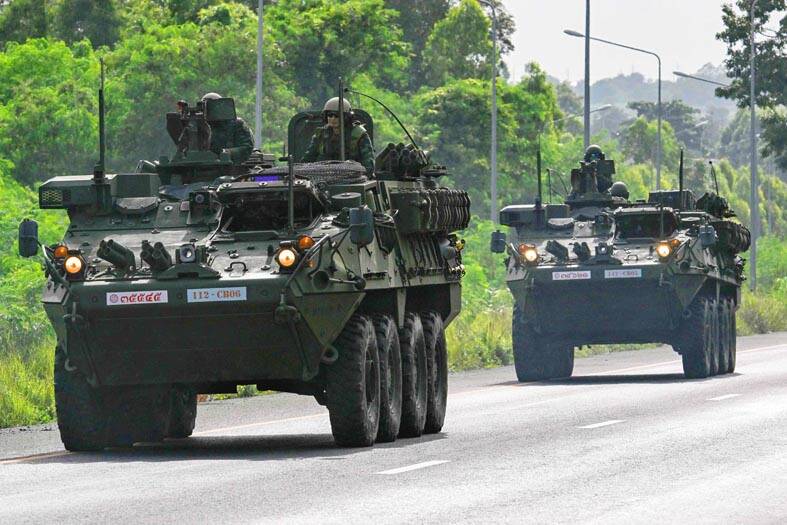Thai and Cambodian soldiers yesterday clashed in several areas along their border in a major escalation of their conflict that left at least 11 people dead, mostly civilians.
The two sides fired small arms, artillery and rockets, and Thailand also called in airstrikes.
Villagers on the Thai side could be seen on video fleeing their homes to seek shelter as the clashes began in the morning.

Photo: AFP
Fighting was ongoing in at least six areas along the border, Thai Ministry of Defense spokesman Surasant Kongsiri said.
The trigger for the clashes was a mine explosion along the border on Wednesday that wounded five Thai soldiers, and led Bangkok to withdraw its ambassador to Cambodia and expel Cambodia’s.
Thailand has also sealed all land border crossings, while urging its citizens to leave Cambodia.
The Southeast Asian neighbors have long-standing border disputes that periodically flare along their 800km frontier and usually result in brief confrontations that sometimes involves exchanges of gunfire.
Each side accuses the other of starting the fighting.
The first clash yesterday morning happened in an area near the Ta Muen Thom temple along the border of Thailand’s Surin Province and Cambodia’s Oddar Meanchey Province.
The Thai army said its forces heard a drone before seeing six armed Cambodian soldiers moving closer to Thai military positions.
It said Thai soldiers tried to shout at them to defuse the situation, but the Cambodian side opened fire.
The Cambodian Ministry of National Defense said that Thailand deployed a drone first before opening fire and that Cambodia “acted strictly within the bounds of self-defense, responding to an unprovoked incursion by Thai troops that violated our territorial integrity.”
Cambodian Prime Minister Hun Manet wrote to the president of the UN Security Council asking for an urgent meeting “to stop Thailand’s aggression.”
Acting Thai Prime Minister Phumtham Wechayachai said that 11 people had died — 10 civilians and one soldier.
Cambodia released no details on deaths or injuries on its side.

Conflict with Taiwan could leave China with “massive economic disruption, catastrophic military losses, significant social unrest, and devastating sanctions,” a US think tank said in a report released on Monday. The German Marshall Fund released a report titled If China Attacks Taiwan: The Consequences for China of “Minor Conflict” and “Major War” Scenarios. The report details the “massive” economic, military, social and international costs to China in the event of a minor conflict or major war with Taiwan, estimating that the Chinese People’s Liberation Army (PLA) could sustain losses of more than half of its active-duty ground forces, including 100,000 troops. Understanding Chinese

The Ministry of Foreign Affairs (MOFA) yesterday said it is closely monitoring developments in Venezuela, and would continue to cooperate with democratic allies and work together for regional and global security, stability, and prosperity. The remarks came after the US on Saturday launched a series of airstrikes in Venezuela and kidnapped Venezuelan President Nicolas Maduro, who was later flown to New York along with his wife. The pair face US charges related to drug trafficking and alleged cooperation with gangs designated as terrorist organizations. Maduro has denied the allegations. The ministry said that it is closely monitoring the political and economic situation

‘SLICING METHOD’: In the event of a blockade, the China Coast Guard would intercept Taiwanese ships while its navy would seek to deter foreign intervention China’s military drills around Taiwan this week signaled potential strategies to cut the nation off from energy supplies and foreign military assistance, a US think tank report said. The Chinese People’s Liberation Army (PLA) conducted what it called “Justice Mission 2025” exercises from Monday to Tuesday in five maritime zones and airspace around Taiwan, calling them a warning to “Taiwanese independence” forces. In a report released on Wednesday, the Institute for the Study of War said the exercises effectively simulated blocking shipping routes to major port cities, including Kaohsiung, Keelung and Hualien. Taiwan would be highly vulnerable under such a blockade, because it

UNRELENTING: China attempted cyberattacks on Taiwan’s critical infrastructure 2.63 million times per day last year, up from 1.23 million in 2023, the NSB said China’s cyberarmy has long engaged in cyberattacks against Taiwan’s critical infrastructure, employing diverse and evolving tactics, the National Security Bureau (NSB) said yesterday, adding that cyberattacks on critical energy infrastructure last year increased 10-fold compared with the previous year. The NSB yesterday released a report titled Analysis on China’s Cyber Threats to Taiwan’s Critical Infrastructure in 2025, outlining the number of cyberattacks, major tactics and hacker groups. Taiwan’s national intelligence community identified a large number of cybersecurity incidents last year, the bureau said in a statement. China’s cyberarmy last year launched an average of 2.63 million intrusion attempts per day targeting Taiwan’s critical